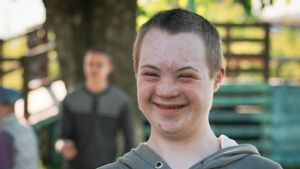JAKARTA - Eating is a daily activity, even an obligation that must be done to keep the body fit and maintain the body's nutrition. However, have you ever had trouble sleeping if you haven't eaten yet, even in the middle of the night? Or feel you have to eat a lot before bed even though you have dinner? You should know that habits like this are classified as eating disorders.
Usually students often eat a lot or snack at night to accompany them when doing something. For example, when doing assignments, reading books, or other jobs. There are also those who like to eat midnight either because they are hungry or just want to.
Even though it looks normal, the habit of having a midnight meal is not good. Someone who likes to have midnight dinner tends to experience a eating disorder called night eating syndrome (NES).
Quoted from Psych Central, Tuesday, May 14, NES is an eating disorder, characterized by an excessive diet consumption at night or after waking up. People with this condition usually feel a strong desire to eat after dinner until bedtime. They may also find it difficult to sleep and wake up all night just to eat.
Symptoms of this syndrome can be the same as other eating and sleeping disorders. But if you or someone known for experiencing the following signs, it could indicate the NES:
Currently, research is still limited related to NES. However, several factors can play a role in this condition.
Circadian rhythm disorders
A 2020 study shows that people with NES may experience significant changes in the sleep-building cycle and the internal processes responsible for regulating eating and metabolic behavior.
However, research in 2019 showed that the difference in circadian rhythm could depend on individuals. For example, scientists found that some people with the NES had the same sirkadian time rhythm as those who did not have these conditions.
Mental health conditions
Depression and anxiety can contribute to the development of the NES. In a cross-sectional study in 2021, research participants who consume more food at night or throughout the night have a much higher anxiety and depression score than those who do not experience the NES. But keep in mind that symptoms of anxiety and depression can contribute to the NES.
Other eating disorders
According to research in 2019, 5 to 44 percent of NES sufferers also experienced other eating disorders that occurred simultaneously. About 15 to 20 percent of NES sufferers also suffer from BED (Binge Eating Disorder).
Drug use disorders (SUD)
Due to the influence of certain substances on brain chemicals, a person with drug use disorders can experience excessive appetite at night. This most often happens when you don't consume this substance. For example, a smoker will increase the consumption of his food while undergoing a smoking-stop program.
SEE ALSO:
According to a review in 2019, long-term data on the effectiveness of various treatment options are still lacking. However, this may be due to a low level of awareness of the condition. Stigma related to eating disorders can also cause symptoms to not be reported.
However, treatment is still possible and often consists of a multiphase approach involving treatment, such as selective serotonin reuptake inhibitors (SSRIs) and therapy includes:
Doctors and therapists usually work with you to find the best treatment plans. Trying out various strategies before finding the right combination is commonplace.
Eating at night can be a common habit for many people. But if you tend to eat a large portion of daily food after dinner or have difficulty sleeping because of your desire to eat all night, it may indicate that the NES.
Diagnosis of NES usually begins with visits to doctors to determine whether your symptoms are in accordance with DSM criteria. There are treatment options for NES, and doctors and therapists can help decide the best treatment plans. Treatment for NES often includes a combination of therapy and treatment. You may need to try some strategies before finding the right and best strategy.
The English, Chinese, Japanese, Arabic, and French versions are automatically generated by the AI. So there may still be inaccuracies in translating, please always see Indonesian as our main language. (system supported by DigitalSiber.id)















